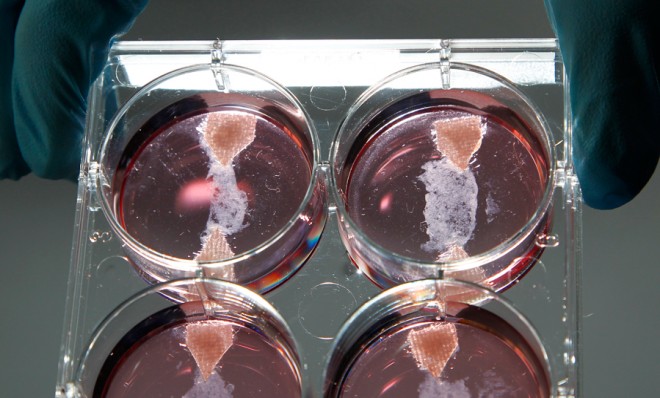What does a $330,000 hamburger grown from stem cells actually taste like?
"Crunchy"

A free daily email with the biggest news stories of the day – and the best features from TheWeek.com
You are now subscribed
Your newsletter sign-up was successful
Two years ago, Mark Post of Maastricht University in the Netherlands set out to create a hamburger synthetically grown in a lab. That meant no actual cows, no bloody slaughterhouses, and just a fraction of the carbon emissions associated with cattle raising.
Today in London, the fruits of Post's laborious quest were finally put to the test, as the $330,000 petri-dish patty was tasted by food writer Josh Schonwald and Austrian food researcher Hanni Rutzler in front of a room full of reporters. The final verdict?
"There is quite some intense flavor," said Rutzler. "The look was quite similar to meat. It has quite a bite." Rutlzer continued:
The Week
Escape your echo chamber. Get the facts behind the news, plus analysis from multiple perspectives.

Sign up for The Week's Free Newsletters
From our morning news briefing to a weekly Good News Newsletter, get the best of The Week delivered directly to your inbox.
From our morning news briefing to a weekly Good News Newsletter, get the best of The Week delivered directly to your inbox.
The surface of the meat was crunchy — surprisingly. The taste itself was as juicy as meat can be, but different. It tastes like meat, not a meat-substitute like soya or whatever. [NBC News]
Schonwald was somewhat less effusive. "There is a leanness to it," he said. "The absence of fat is what makes it taste different… I would say it is somewhere on the spectrum between a Boca Burger [soy burger brand] and McDonald's."
Monday's tasting mixed the lab-grown meat with salt, egg, bread crumbs, as well as red beet juice and saffron to give the patty a more natural, reddish coloring. It was then fried in a pan and lightly seasoned with salt and pepper.
Assembling the faux meat-patty was no easy task. Once the stem cells were extracted from a living cow via biopsy, thin slivers were meticulously arranged — layer by layer — to form the genesis of actual cow muscle tissue. Post says it takes about 20,000 tiny slivers just to create one 5-ounce hamburger.
While lab-grown meat is still a long way from commercial viability, Post says that eventually, one stem-cell sample could be used to create up to 20,000 tons of beef. And remember, cattle raising takes a tremendous ecological toll on the environment, and is largely considered to be unsustainable.
A free daily email with the biggest news stories of the day – and the best features from TheWeek.com
A 2006 United Nations report, for example, revealed that the meat industry generates "more global-warming greenhouse gases, as measured in CO2 equivalent, than transportation." And yes, a hulking percentage of the environmental the damage is wrought from what's emitted out of cows' butts:
When emissions from land use and land use change are included, the livestock sector accounts for 9 percent of CO2 deriving from human-related activities, but produces a much larger share of even more harmful greenhouse gases. It generates 65 percent of human-related nitrous oxide, which has 296 times the Global Warming Potential (GWP) of CO2. Most of this comes from manure.
And it accounts for respectively 37 percent of all human-induced methane (23 times as warming as CO2), which is largely produced by the digestive system of ruminants, and 64 percent of ammonia, which contributes significantly to acid rain. [UN.org]
Post's project was funded largely by one mystery donor, who has remained in the dark — until now. On Monday, the project's backer was revealed to be none other than Google co-founder and Glass-futurist Sergey Brin. "If it succeeds there, it can be really transformative for the world," Brin told the Guardian. "If what you're doing is not seen by some people as science fiction, it's probably not transformative enough."
So: Would you give lab-grown hamburger meat a try? Let us know below.
-
 The Week Unwrapped: Do the Freemasons have too much sway in the police force?
The Week Unwrapped: Do the Freemasons have too much sway in the police force?Podcast Plus, what does the growing popularity of prediction markets mean for the future? And why are UK film and TV workers struggling?
-
 Properties of the week: pretty thatched cottages
Properties of the week: pretty thatched cottagesThe Week Recommends Featuring homes in West Sussex, Dorset and Suffolk
-
 The week’s best photos
The week’s best photosIn Pictures An explosive meal, a carnival of joy, and more